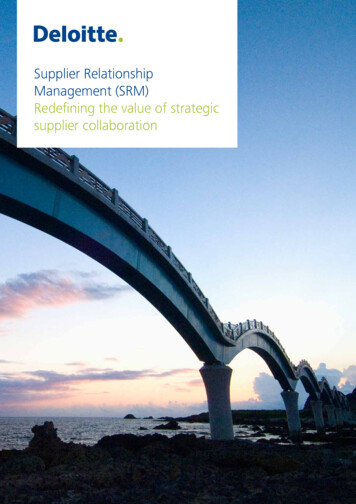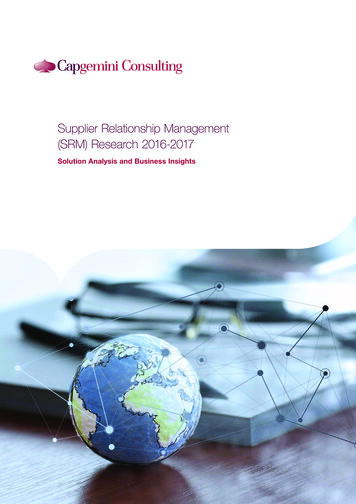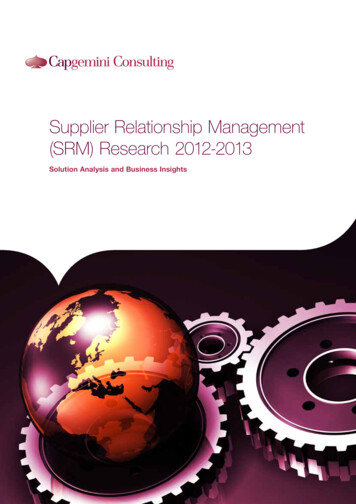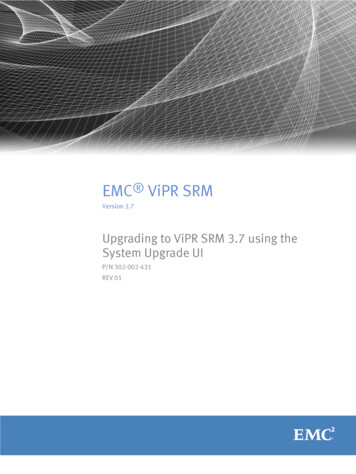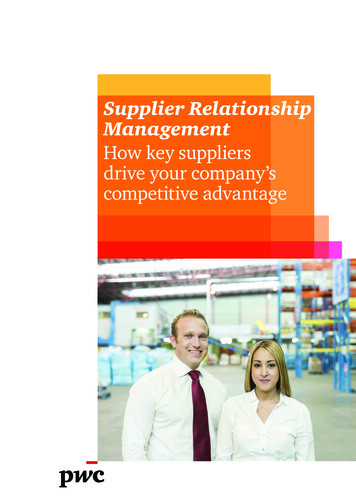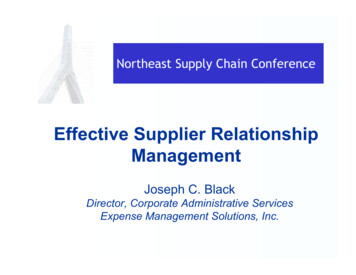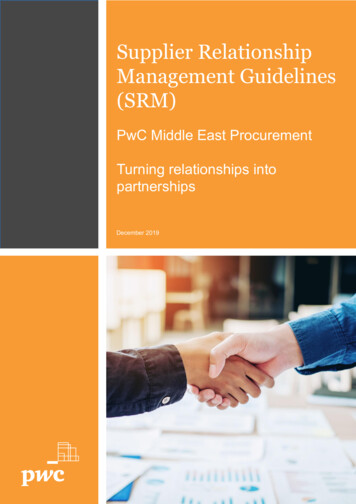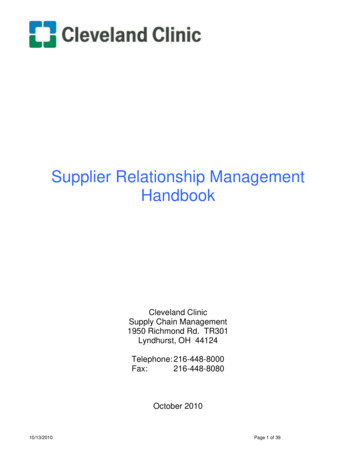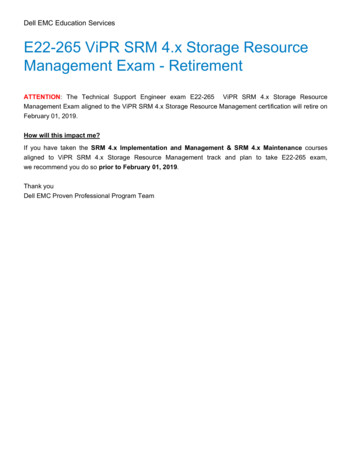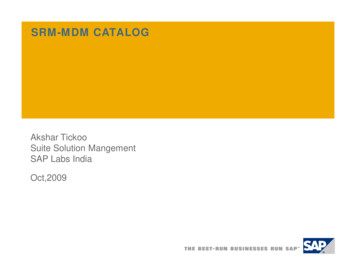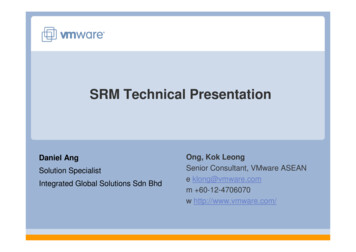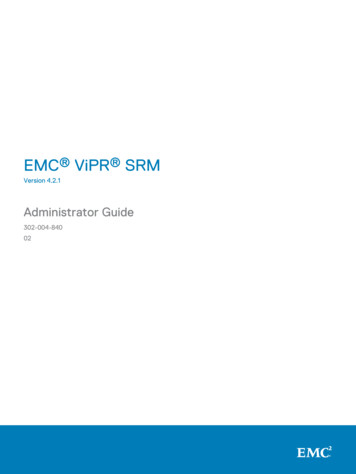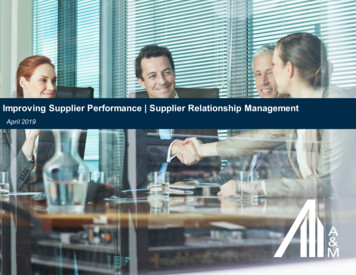
Transcription
Improving Supplier Performance Supplier Relationship ManagementApril 2019
Supplier Relationship Management Did you know?Supplier Relationship Management enables information exchange and joint problemsolving to enhance spend visibility. 75% of budgeted sourcing savings can disappearwithin 18 months without rigorous, structured supplier management processNegotiatedLeakageIdentifiedCharacterized by sourcing activity and negotiated pricing, where savingspotential is attainable.12.0%ImplementedRealizedLost4.0%After the contract has been executed, the bank begins to realize theidentified savings.2.5%9.5%Once savings are realized, savings can be lost over time withoutSupplier Relationship Management8.0%Source: Aberdeen Group: The CFO’s View of ProcurementIn order for an organization to sustain the benefits of a mature Strategic Sourcing process, a shift of theSupplier Relationship Management function must occurTypical SRMMarket-Leading SRM Some understanding of risk Risk is closely managed May not have full redundancy Supply continuity is ensured Cost reductions budgeted Cost reductions are fully achieved Some gaps In people or process Controls / compliance are defined Relationships are reactive Win – Win Relationship1
Supplier Relationship Management What?Supplier Relationship Management (SRM) is a set of principles and processes forestablishing the governance structure for managing a supplier relationship. It focuses onthe performance and development of the relationship, while identifying and mitigatingpotential risk and creating valueSupplier Performance ImprovementDriving supplier performance improvementand reducing Total Cost of Ownershipthrough systematic supplier management(supplier scorecard, feedback, and review)and continuous improvement programsSupplier Risk ManagementUnderstanding critical suppliersthrough three dimensions:materiality and relevance, potentialbusiness impact associated withsupplier unavailability, andprobability of supplier defaultSupplier RiskManagementSupplier DevelopmentSupplier involvement and collaborationthroughout the product / service lifecycle inorder to identify value engineering andinnovation opportunities and continuouslyeliminate waste and reduce cost whileImproving quality2Effective SRM
Supplier Relationship Management Why?.Ever changing economic conditions, market competition and improving the customerexperience are driving organizations to adopt a more strategic, holistic and collaborativeapproach to leveraging and managing their suppliersImprove Relationshipswith Top SuppliersIncreased Top to TopConnectivity Move from transactional to engagingsupplier relationships Structure more frequent, transparent,and effective interactions Demonstrates commitment torelationshipAbility to escalate issues toleadership more easily Demonstrates commitment torelationshipOpportunity to develop relationshipwith leadership and top decisionmakersImproved Communication Agreed upon meeting cadence andstructure Transparency of successors anddetractors from the relationship SRM provides a forum / platform foraddressing issuesImproved ResourceAllocation on AccountCloser CoordinationIncreased Understandingof Strategic Objectives Suppliers will have a betterunderstanding of company needsand align account managementaccordingly Established cadence of discussionsenables better coordination ofschedules and day-to-day priorities Improved resource alignment allowsfor better use of time duringCompany/supplier engagements Close coordination establishesworking norms that can be the basisfor mitigating issues and identifyingmutually beneficial opportunities3SRM provides the forum to reviewthe company and suppliers’ strategicobjectives and understand eachother’s perspective on the market Understanding goals and perspectivewill lead to a more engaging andmutually beneficial relationship
Supplier Relationship Management Success FactorsIn order to develop and implement an effective Supplier Relationship Managementprogram, the following critical success factors should be considered.Strategic Planning Ensure senior management buy-in: Demonstrate not only cost savings and risk avoidance, but also the added value that high-performing suppliers can bringAlign supplier management with corporate and organizational goals and objectivesEngage a cross-functional team that includes other groups within the organization such as business units, finance, risk management, legal,and ITConsider a phased approach when rolling out a supplier management program, perhaps starting with a pilot phase that includes suppliersthat can deliver “quick wins”Performance Management Measure what matters: What getsmeasured gets managedUse both quantitative measures (e.g. Fillrate, on-time delivery %) and qualitativemeasures (e.g. stakeholder satisfaction,supplier’s value-added contributions)Baseline and set performance targetsfor metrics usedSupplier performance managementshould not be used primarily as apunitive measure; rather as a tool foridentifying/closing performance gapsRisk Management When assessing supplier risk, acombination of micro and macro riskfactors should be reviewed A high risk profile does not necessarily disqualify a potential supplier; however, itshould lead to further investigation andformal discussions on mitigationstrategiesA cross-functional team approach (withrepresentation from enterprise risk,finance, and procurement) works bestwhen assessing supplier riskDevelopment Ensure information sharing between the organization and the suppliers (but besure not to share information that mayerode your leverage)Develop mutual trust built ontransparency, realistic commitments, andexecutive management alignmentBuild true joint efforts with equitableresource input, dedicated people, andsharing of productivity gains Emphasize total value creation, not pricereductionBegin realizing cost and risk reductions, value creation and the benefits ofenhanced strategic supplier relationships and business alignment4
Supplier Relationship Management Our ExpertsCyndi Joiner Managing DirectorRamin Tabibzadeh Managing DirectorJulie Diehl Managing DirectorAtlanta404 839 0845cjoiner@alvarezandmarsal.comLos Angeles310 975 2696rtabibzadeh@alvarezandmarsal.comHouston713 478 8334jdiehl@alvarezandmarsal.comArt Hall Senior DirectorChris Clower DirectorAllison Earnest DirectorAtlanta404 260 4152ahall@alvarezandmarsal.comSeattle206 856 2718cclower@alvarezandmarsal.comDenver412 719 1662aearnest@alvarezandmarsal.comKamran Siddiqui Senior DirectorJürgen Wetzstein Managing DirectorJon Higginson Senior DirectorAtlanta404 831 4396ksiddiqui@alvarezandmarsal.comMunich 49 175 405 0090jwetzstein@alvarezandmarsal.comLondon 44 7825 418353jhigginson@alvarezandmarsal.comCorporate Performance ImprovementCorporate Performance ImprovementPrivate Equity Performance ImprovementCorporate Performance ImprovementCorporate Performance ImprovementCorporate Transformation Services5Corporate Performance ImprovementPrivate Equity Performance ImprovementCorporate Transformation Services
Supplier Relationship Management function must occur. 2. Supplier Risk. Management. Effective SRM. Supplier Performance Improvement. Driving supplier performance improvement and reducing Total Cost of Ownership through systematic supplier management (supplier scorecard, feedback, and review) and continuous improvement programs . Supplier Risk Management. Understanding critical
